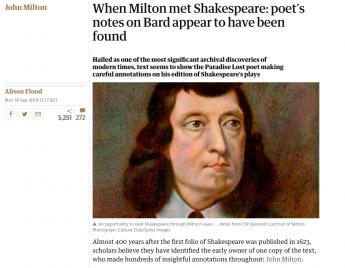News & Updates
Significant archival discovery at Free Library Philadelphia

The Guardian, 16 September 2019, writes:
When Milton met Shakespeare: poet's notes on Bard appear to have been found
Hailed as one of the most significant archival discoveries of modern times, text seems to show the Paradise Lost poet making careful annotations on his edition of Shakespeare’s plays
Almost 400 years after the first folio of Shakespeare was published in 1623, scholars believe they have identified the early owner of one copy of the text, who made hundreds of insightful annotations throughout: John Milton.
The astonishing find, which academics say could be one of the most important literary discoveries of modern times, was made by Cambridge University fellow Jason Scott-Warren when he was reading an article about the anonymous annotator by Pennsylvania State University English professor Claire Bourne. Bourne’s study of this copy, which has been housed in the Free Library of Philadelphia since 1944, dated the annotator to the mid-17th century, finding them alive to “the sense, accuracy, and interpretative possibility of the dialogue”. She also provided many images of the handwritten notes, which struck Scott-Warren as looking oddly similar to Milton’s hand.
“But I always think ‘I recognise that handwriting,’” Scott-Warren said. “I go and check and normally I’m wrong. This time I thought: ‘The case is getting stronger and stronger’.”
...
As well as numerous textual annotations, the folio also contains a host of line markings, showing the annotator’s engagement with, particularly, Hamlet, Romeo and Juliet, Macbeth, The Tempest, Henry IV, As You Like It and King Lear. Scott-Warren believes these can be traced to Milton’s own work.
“The book is absolutely covered with lines in the margin of passages and when you’re reading those thinking the annotator is Milton they become really interesting,” he said. “It’s how they echo with his work, the sense that the volume offers you the opportunity to read Shakespeare through Milton’s eyes. Because the lines in the margin don’t give you any verbal content, you don’t know why he’s singled out a passage for attention, but it forces you to think your way into Milton’s head and it does really chime with a lot of what goes on in his poetry, so you can see him constructing himself through Shakespeare.”
One highlighted section in The Tempest is the song: “Come unto these yellow sands, / And then take hands: / Courtsied when you have and kiss’d / The wild waves whist.” The unusual rhyme, of “kiss’d” and “whist”, is echoed in Milton’s On the Morning of Christ’s Nativity: “The winds with wonder whist, / Smoothly the waters kist.”
“We would already have known about that allusion, they are the only two writers who used that rhyme, but you can see him marking it in the text and responding to it,” said Scott-Warren. “It gives you a sense of his sensitivity and alertness to Shakespeare. What’s quite remarkable as well is that he’s singled out for attention lots of the passages that have become incredibly famous – he goes through and marks out some of the most celebrated Shakespearean speeches.”
